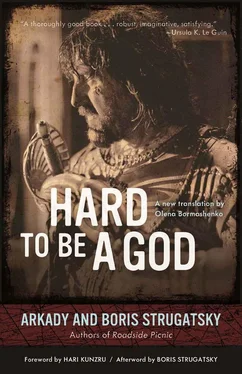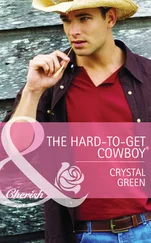“Eunuch!” she shouted after him. “Gelding! Old woman! To the gallows with you!”
Rumata opened a random window and jumped down into the garden. He stood underneath the tree for a while, greedily gulping the cool air. Then he remembered the idiotic white feather, pulled it out, crushed it furiously, and threw it away. Pashka wouldn’t have been able to do it either, he thought. No one would have been able to. Are you sure about that? Yes, I’m sure. Then you aren’t worth much! But it makes me sick! The Experiment doesn’t care about your feelings—if you can’t do it, don’t try. I’m not an animal! If the Experiment demands it, you must become an animal! The Experiment can’t demand that. As you can see, it can. In that case…
In that case what? He didn’t know what. In that case… In that case… All right, let’s assume that I’m a bad historian. He shrugged. I’ll try to improve. We’ll learn how to become pigs.
When he came home, it was about midnight. He didn’t get undressed, only undid the clasps on his sword slings, collapsed onto the sofa in the living room, and slept like a log.
He was woken up by Uno’s indignant cries and an amiable bass roar: “Go away, go away, cub, or I’ll twist your ear off!”
“He’s sleeping, I tell you!”
“Scram, don’t get in the way!”
“I was ordered not to, I tell you!”
The door swung open, and Baron Pampa don Bau barged into the living room—enormous like the beast Pekh, red-cheeked, white-toothed, and with a pointy mustache. He was wearing a velvet beret cocked to the side and a splendid raspberry cloak, his copper armor shining dully underneath. Uno trailed behind him, clutching the baron’s right pant leg.
“Baron!” Rumata exclaimed, swinging his legs down from the sofa. “How did you come to be in town, dear friend? Uno, leave the baron alone!”
“An extraordinarily insistent boy,” rumbled the baron, approaching Rumata with open arms. “He’ll turn out well. How much do you want for him? But we’ll talk about that later. Let me embrace you!”
They embraced. The baron smelled deliciously of the dusty road, horse sweat, and a bouquet of various wines.
“I see that you’re completely sober, my friend,” he said with disappointment. “But then you’re always sober. Lucky man!”
“Have a seat, my friend,” said Rumata. “Uno! Bring us Estorian wine, and lots of it!”
The baron raised his huge hand. “Not a drop!”
“Not a drop of Estorian wine? Uno, don’t bring Estorian wine, bring Irukanian wine!”
“No wine at all!” the baron said bitterly. “I’m not drinking.”
Rumata sat down. “What happened?” he asked anxiously. “Are you not feeling well?”
“I’m as strong as an ox. But these damned family scenes… In short, I had a fight with the baroness—and here I am.”
“A fight with the baroness! You? Come, Baron, what a strange joke!”
“If you can believe it. I’m in a daze myself. A hundred and twenty miles galloped in a daze!”
“My friend,” said Rumata. “We are immediately saddling our horses and riding to Bau.”
“But my horse hasn’t rested yet!” objected the baron. “And anyway, I want to punish her!”
“Who?”
“The baroness, damn it! After all, am I a man or not?! She’s dissatisfied with Pampa drunk, you see, so let her see what he’s like sober! I’d rather rot here from drinking water than return to the castle.”
Uno said gloomily, “Tell him not to twist any ears.”
“Go away, cub!” the baron rumbled genially. “And bring me some beer! I’ve been sweating, and I need to compensate for the loss of liquid!”
The baron compensated for the loss of liquid for half an hour and became a bit tipsy. In between sips he related his troubles to Rumata. He spent some time cursing at “my drunkard neighbors, who are always in and out of the castle. They show up in the morning, supposedly to hunt, and before you know it they are drunk and chopping up the furniture. They wander all over the castle, make a horrible mess, insult the servants, injure the dogs, and set a horrible example for the young baronet. Then they go home and leave you as drunk as a lord, alone with the baroness…” At the end of this story the baron became completely dejected and even demanded some Estorian wine, but recollected himself and said, “Rumata, my friend, let’s leave this place. Your cellar is much too well stocked! Let us ride away!”
“But where should we go?”
“It doesn’t matter where! Say, the Gray Joy.”
“Hmm,” said Rumata. “And what will we do at the Gray Joy?”
The baron was silent for some time, fiercely tugging on his mustache. “What do you mean?” he asked finally. “What a strange question. We’ll sit, we’ll talk…”
“At the Gray Joy?” Rumata asked doubtfully.
“Yes. I see what you’re saying,” said the baron. “It’s horrible. But we really must leave. When I’m here, I keep wanting to order Estorian wine!”
“Get me a horse,” said Rumata. He went into his study to get the transmitter.
In a few minutes, they were riding side by side down a narrow, pitch-black street. The baron, who had cheered up somewhat, was loudly describing the boar hunt from the day before yesterday, the remarkable qualities of the young baronet, and the miracle in the monastery of Holy Tuca, in which the father abbot gave birth to a six-fingered boy from his hip. He also remembered to have some fun: once in a while, he’d howl like a wolf, hoot, and bang his whip on the closed shutters.
When they arrived at the Gray Joy, the baron reined in his horse and fell into deep thought. Rumata waited. The dingy inn windows shone brightly and horses pranced at the hitching post; a few painted girls were sitting side by side on a bench beneath the windows and squabbling lazily, while two servants were straining to roll a huge barrel covered in nitrate stains through the open doors.
The baron said sadly, “All alone… I hate to think of it—the whole night is ahead of us, and I’m all alone! And she’s all alone at home.”
“Don’t be so upset, my friend,” Rumata said. “After all, the baronet is keeping her company, and I’m here with you.”
“That’s completely different,” said the baron. “You don’t understand at all, my friend. You’re too young and flighty. You probably even get pleasure out of looking at these whores.”
“Well, why not?” Rumata said, looking curiously at the baron. “They seem like very nice girls.”
The baron shook his head and smiled sarcastically. “The one standing up,” he said loudly, “has a saggy ass. And the one brushing her hair has no ass at all. These are cows, my friend—at best these are cows. Just think of the baroness! Think of her hands, her grace! Think of her poise, my friend!”
“Yes,” Rumata agreed. “The baroness is lovely. Let’s leave this place.”
“Where would we go?” the baron asked with melancholy. “And why?” Resolve suddenly appeared on his face. “No, my friend, I’m not leaving this place. You do what you like.” He started climbing off his horse. “Although I would be very hurt if you left me here alone.”
“Of course I’ll stay with you,” Rumata said. “But—”
“No buts,” the baron said.
They threw the reins to an approaching servant, proudly walked past the girls, and entered the hall. It was stifling inside. The lamplight barely penetrated the mist of fumes, as if they were in a large and very dirty steam bath. The benches by the long tables were filled with sweaty soldiers in unbuttoned uniforms, seafaring vagrants in colorful caftans over naked bodies, women with barely covered breasts, gray storm troopers holding their axes between their knees, and craftsmen in scorched rags—all of whom were drinking, eating, cursing, laughing, crying, kissing, and bawling bawdy songs. To the left of them, you could make out a bar, behind which the owner sat at a special dais between giant barrels, managing the swarm of nimble, shifty-eyed servants. To the right of them, a bright rectangle of light shone through—the entrance to the clean half, which was reserved for noble dons, respectable merchants, and gray officers.
Читать дальше












